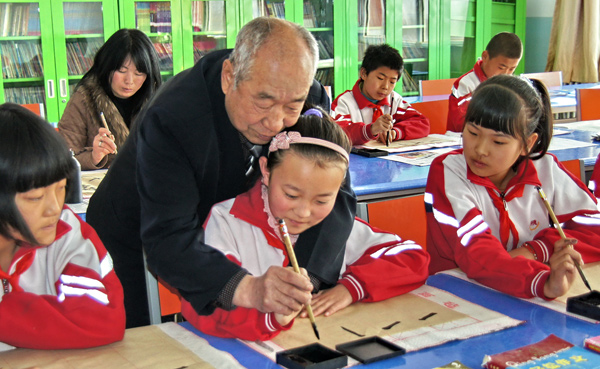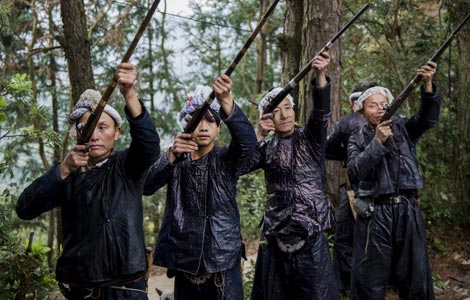Retirees struggling to find meaningful work
Updated: 2013-12-19 23:55
By He Dan and Fan Feifei (China Daily)
|
||||||||
 |
|
Chen Guokun, 72, teaches a student how to use a calligraphy brush at a primary school in Hohhot, the Inner Mongolia autonomous region, in March. Chen is a retired teacher but has volunteered at the school for more than a year.[Photo / Xinhua] |
The average retirement age for Chinese employees is 53, said Chen Chuanshu, deputy director of the China National Committee on Aging, at a Beijing conference on volunteering opportunities for retirees.
"Most enterprises prefer to hire young people. Many seniors were forced to leave the employment market not because they are incapable of working or their knowledge is outdated, but because of social prejudice and discriminatory regulations," he said.
China's rapidly aging population and the relatively early age at which people retire will place greater pressure on the economy, he warned.
China has more than 200 million people who are 60 and older this year. A report from the United Nations Development Programme in August predicted that those over 65 will account for 18.2 percent of China's total population in 2030, given this year's rate of 9.1 percent.
Social participation, especially in the workplace, is a vital way for the elderly to obtain more financial resources and a sense of achievement, in addition to reducing their economic burdens, Chen said.
The legal retirement age in China is 60 for male workers and officials, 50 for female workers, and 55 for female officials. Chinese leaders decided during the Third Plenary Session of the 18th Communist Party of China Central Committee in November to gradually raise the retirement age. However, the specific reform plan has not been revealed yet.
At a news conference last Thursday, Vice-Minister of Human Resources and Social Security Hu Xiaoyi denied media speculation that the higher retirement age will begin with civil servants or blue-collar workers.
He said the government will pay more attention to the employment and training of the middle-aged and elderly and come up with better incentives to keep them employed.
One woman who wasn't ready to quit working is Shi Hui, who retired from the Beijing Research Institute of Mechanical and Electrical Technology in July at the age of 50 and then found a job as a saleswoman at a clothing shop.
"The living pressure is great for me because my pension is only half my working wage before retirement," the former office clerk said.
Working makes life more fulfilling and interesting, she added.
However, job opportunities available for the retired are limited, and some employers want to recruit young people so they can "establish a better corporate image", she said.
Guo Ping, a researcher from the China Research Center on Aging, said retired doctors and engineers usually enjoy more opportunities than their blue-collar peers in the job market because doctors and engineers are valued for their years of experience, so retired professionals actually are more competitive on the job market than young graduates are.
The China National Committee on Aging launched a campaign called "Gray-haired Action" that encourages retired professionals, including medical personnel and scientists from big cities, to volunteer in economically less-developed regions in 2003.
About 5 million elderly volunteers from 31 provinces and regions have participated in the campaign and generated economic value of about 8 billion yuan ($1.32 billion).
Contact the writers at
hedan@chinadaily.com.cn and fanfeifei@chinadaily.com.cn

 Former NBA player may coach in DPRK
Former NBA player may coach in DPRK
 Misses International shine in Tokyo
Misses International shine in Tokyo
 Parents urged to supervise children's TV-viewing habits
Parents urged to supervise children's TV-viewing habits
 Jazzing up Beijing
Jazzing up Beijing
 US delegation to Sochi includes gay athletes
US delegation to Sochi includes gay athletes
 Snow storm wallops NE USA
Snow storm wallops NE USA Russia to bail out Ukraine for $15 billion
Russia to bail out Ukraine for $15 billion
 Fatal tiger attack 'points to flaws in zoo management'
Fatal tiger attack 'points to flaws in zoo management'
Most Viewed
Editor's Picks

|

|

|

|

|

|
Today's Top News
Baucus likely next ambassador to China
Senator Baucus to be named ambassador to China
Treasure Island still radioactive?
Military plays down 'near-miss' between warships
Fed to cut bond purchases by $10B
Overseas investing sees large jump
China expands research in Antarctica
Cloud seeding plans spark debate
US Weekly

|

|







